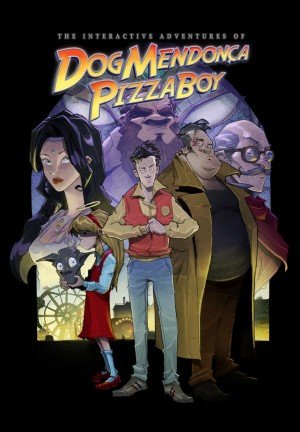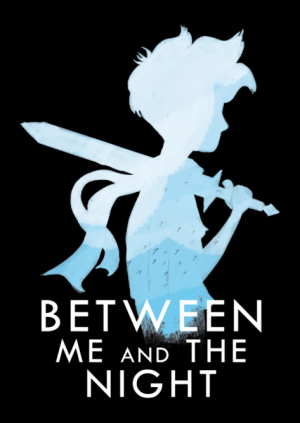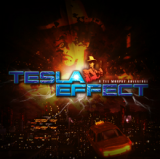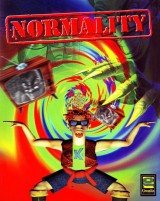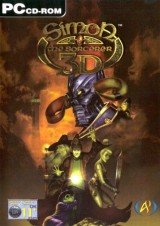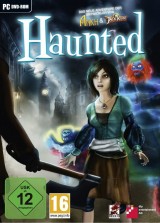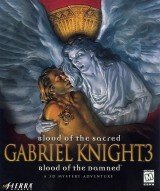Review for The Interactive Adventures of Dog Mendonça & Pizza Boy
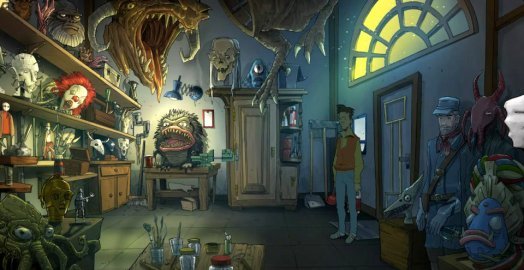
It seems fair to assume that many people interested The Interactive Adventures of Dog Mendonça and Pizza Boy will be drawn to it by their familiarity with the Portuguese graphic novel series on which it’s based. The books, published in the U.S. by Dark Horse Comics, are wild romps through the supernatural underbelly of Lisbon, filled as much with graphic violence as adult humor. Adapting the aesthetics, pacing, and character dynamics of the source material to the point-and-click adventure format – and doing so faithfully – is a critical point upon which much of the game’s success will hinge for such people. However, while the result is a decent adventure game in its own right, it falls a bit short of the mark when attempting to ape the established feel of the franchise, so newcomers may enjoy the experience more than existing fans.
The game features the same quartet of anti-heroes as the graphic novels: Dog Mendonça, the gruff but loveable leader of the team who also happens to be a shape-shifting werewolf; Eurico, the ex-pizza delivery boy, now Dog’s sidekick and the only one in the group that’s a plain human; a six-thousand-year-old demon named Pazuul, currently inhabiting the body of a little girl; and Gargoyle, the severed-but-talkative head of – what else? – a gargoyle. But rather than capitalizing on these exotic characters, the game pares down the team dynamic by taking Dog out of the equation immediately following the intro cinematic. Instead, it’s Eurico who leads his own investigation into his mentor’s sudden disappearance and a mysterious curse. Pazuul and Gargoyle are relegated to on-screen placeholders, as they don’t offer much in the way of assistance. This key component of the novels is in essence reduced to a one-man show.
On the other end of the spectrum, the game brings the supernatural world of Lisbon alive with all manner of esoteric creatures that roam the underworld and the afterlife. Populating locations such as a fun fair, a creepy wax museum, a haunted hotel, and Mrs. Chen's palace in Chinatown are familiar characters like the Invisible Man and an abundance of more fantastical creatures: you’ll meet an actual loan shark, go toe-to-pugilistic-toe with the ghost of Mike Tyson, and narrowly escape a bad case of body possession by Daniel, the friendly neighborhood Dybbuk. The imaginative universe of the graphic novels is well represented here, with the same sort of humor that fans of the comics have come to expect.
But what about those who come to the game with no preconceived notions of what to expect? Dog Mendonça and Pizza Boy is a solid enough classic-styled point-and-click adventure, though it never truly excels in any area. For example: the story. The case given to the team by an enigmatic girl seems to revolve around an ancient gypsy curse. However, this appears to be nothing but a red herring, as every character Eurico questions on the subject repeatedly tells him that there’s no such thing as gypsy curses. Instead, the real mystery is about Dog, who’s gone off on his own search and disappeared, having apparently been several steps ahead of Eurico. But the search for Dog is no more than a cheap vehicle that drives the need for convoluted obstacles in one location after another. By the time I finally found Dog again, I honestly had lost all interest in how the separate pieces of the narrative even fit together. And strangely, the game often seems as if it was made with a much younger audience in mind, only to suddenly resort to a random line of filthy dialog thrown in out of the blue.
In place of Dog’s shape-shifting or Pazuul’s super strength, Eurico has to resort to trickery and subterfuge. Tasks like jerry-rigging carnival games are standard adventure game fare, but they seem like missed opportunities given the built-in playfulness the game had at its disposal. To be sure, the inventory-based puzzles are generally intuitive and well-clued, but they tend to be on the simpler side. Rather than an on-screen inventory pane, Eurico literally stores items in his jacket; clicking on his hand on the right edge of the screen will cause him to “open his jacket”, which covers half the screen with its contents to use or combine to create something new.
A couple of odd, out-of-character minigame moments also occur during the investigation. Eurico, normally a practical man who avoids confrontation, will engage in a classic duel of fisticuffs with one supernatural adversary or another. This happens via a minigame emulation of the Nintendo classic Punch-Out. Using keyboard buttons, players have to make Eurico dodge the attacker’s blows while trying to land his own. It sounds frantic, but following the very simple dodge/attack pattern dictated by the enemy punches poses no challenge at all, and the only purpose it really seems to serve is as an elaborate throwback to the ‘80s.
If needed, you can also click on Eurico’s notepad, tucked away in a pocket in his jacket, which acts as the game’s walkthrough. Before resorting to this help feature, however, beware that there is nothing subtle about the “hints” provided: each section of the game has its own page, including an explicit step-by-step walkthrough for how to proceed past it. Rather than use story-friendly terms, the hint system will tell you to “use item x on object y”, and thus should only be used when absolutely necessary. And it really shouldn’t be required very often, if ever, as a bit of basic intuition is all that’s required to avoid getting stuck. Eurico and the team automatically move from one major world area to another as the plot unfolds, each with only a handful of locations to explore and an even more limiting number of interactive hotspots. Even the best-designed puzzles can only stretch so far when players are funneled towards the solution.
Dog Mendonça and Pizza Boy puts its best foot forward when it comes to its presentation. Each hand-drawn scene is a pleasure to look at, and nearly every environment is stuffed full of interesting details to take in. References to favorite ‘80s and ‘90s iconic characters are overtly hidden in plain sight: in one scene, Masters of the Universe’s Orko can be spotted sitting at a table in the background, while in another location, the head of everyone’s favorite Alien Life Form adorns a space on the wall. It’s a shame that with such a wealth of engrossing things on display that you are only ever able to make Eurico interact with or examine a small handful of them. The majority of eye candy goes criminally ignored. The designers took advantage of the material’s comic book heritage by inserting the occasional cutaway panel or close-up still to provide an assist on the storytelling front. Character animations, however, don’t quite measure up to the standard set by the art; Eurico’s bored mien in particular can be off-putting when it clashes with his excited chatter.
The game does score a solid plus point in its audio department. The dialog is fully voiced, and competently so (though I got quite tired of hearing some lines repeated over and over – choosing to click on the “mouth” icon on almost any hotspot will yield the same line from Eurico about licking it). There is even a simple interrogation mechanic used when interviewing potential suspects, in which players must choose from “good cop” or “bad cop” responses to get the most potential information out of their subjects. Another pleasant addition is the music used throughout the game, consisting of brassy jazz tunes evocative of classic hard-boiled detective stories.
What The Interactive Adventures of Dog Mendonça and Pizza Boy brings to the table throughout its five or so hours of play time is kind of a mixed bag, and your enjoyment may depend on where on the fan spectrum you are coming from. The Kickstarter backers who jumped on board due to a love of the graphic novels may be unhappy not to find the same sharp-nosed grit and interactions that characterizes the books, but adventure gamers new to this bizarre universe may be content with the stylish presentation and accessible gameplay. Neither will find a deeply compelling story or challenging experience to really sink their teeth into, but there’s still some fun to be found in this sometimes humorous tongue-in-cheek romp through a colorful world filled with a bizarre cast of characters.




